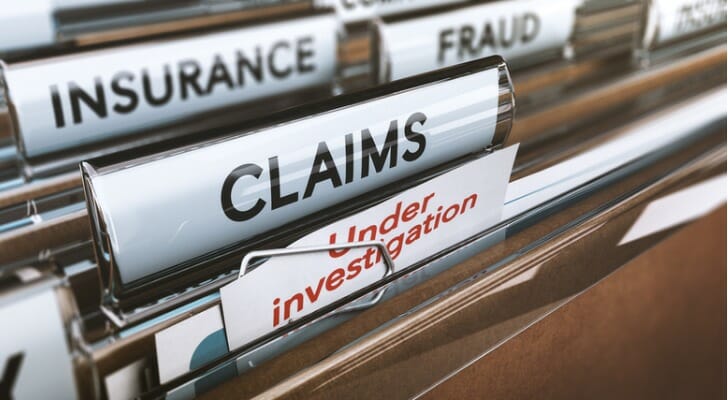Insurance fraud can occur during any stage of the insurance transaction by any party involved. This means that applicants, policyholders, third-party claimants, professionals who provide services to claimants, insurance brokers or agents – even companies – may attempt to commit some type of insurance fraud. Insurance fraudsters have found many ways to take advantage of people. Learning the different types of fraud and understanding life insurance terminology can help you avoid them or know how to report them properly.
A financial advisor can help you compare different insurance options for your financial plan.
Claims Fraud
One of the most common types of fraud is claims fraud, which is when a policyholder makes a claim that never happened or was staged. It can also occur when work was never completed or performed. There are countless reasons and ways this type of fraud can occur. For example, slip-and-fall claims can be staged events. Fraudsters choose this type of fraud because injuries are usually challenging to disprove or prove, and the potential payouts are typically high.
Those trying to commit claims fraud may also damage their car, which they own outright. Once they receive the money from the claim, they may either decide to have their car repaired inexpensively or not get it repaired at all. Homeowners may also attempt this type of fraud by damaging their property for a claim’s payout.
Another example is when a property owner has a building that is worth a lot less than the value on the insurance policy. Therefore, the policyholder may hire someone to commit arson to make it look like an accident so they can receive a higher payment amount. Some homeowners or business owners who are facing bankruptcy may also try this type of fraud to rid themselves of their mortgage or other business debt.
Death Fraud
Another type of claims fraud is known as death fraud. This is when a policyholder fakes his or her death to receive the life insurance payout. While it may seem like something you see out of a book or movie, it does happen in real life.
Conversely, a beneficiary may attempt to murder the policyholder to receive the entire payout. Although this is rare, the insurance company may not pay out the claim to any of the beneficiaries if the death was due to a homicide.
Application Fraud
Some people knowingly lie or provide incorrect information on their life insurance application. This is application fraud or material misrepresentation. Because the cost of a life insurance policy is contingent upon a person’s health, age and more, people may lie about their smoking habits or general health to try to receive a policy at a lower cost.
Therefore, it’s important to be as honest as possible when applying for life insurance. For life insurance approval, some insurers require a medical exam. If you do not know your exact weight when you apply for life insurance, but you are heavier or lighter when you have your medical examination, this is not a material misrepresentation. However, if you lie about being a lifelong smoker, the underwriter and insurance company will either charge you a much higher rate or reject your application.
Inflated Claims
When a natural disaster devastates an entire region, fraudsters attempt to take advantage of the insurance companies. In some cases, homeowners in need of work to their home may sign inflated claims knowing that the repair work was never actually done. In other cases, homeowners might submit a claim but are unaware that the work was never performed.
Some disaster insurance claims are easier to inflate than others, such as roof repair claims. If a homeowner needs to submit a roof damage claim, the roofer may bill the insurance company for higher-quality materials and then switch to sub-par materials when completing the work.
Disaster Fraud Schemes
Not only do fraudsters attempt to inflate claims in the wake of a natural disaster, but there is a wide range of other insurance frauds they may attempt for financial gain. Since there is such a high volume of claims after a disaster occurs, insurance companies may not have the manpower to investigate every claim. Therefore, some policyholders may submit a claim for a home that was completely untouched during the disaster. Since insurance companies often rely on data to determine which homes are eligible for coverage, they may pay out a claim sight unseen.
Other disaster fraud schemes may include misclassification as flood, wind or fire damages. Some schemes entail charity fraud created to misappropriate funds donated for disaster relief.
For instance, according to the FBI, Hurricane Katrina left $100 billion of damage in its wake. However, insurance companies paid out over $34.4 billion in addition to the $80 billion in government funding. The FBI estimates that roughly $6 billion of government funding went to insurance fraud alone.
Insurance Company Fraud
Insurance fraud doesn’t always come from policyholders or others trying to take advantage of the insurance company. Sometimes, insurance companies try to take advantage of consumers. Here are some of the most common insurance fraud scams you should be aware of.
- Selling phony insurance policies: An agent or insurance company representative may attempt to sell you fake coverage through a phony insurance company or try to sell fake coverage using a legitimate insurance company’s name.
- Selling coverage you don’t need: Agents use several tactics to try to sell consumers coverage they don’t need. Some fraudsters use a sliding tactic, which is when an agent may add on additional coverage and claim that it is part of the policy. Some additional coverage options fraudsters try to sell include motor club memberships, accidental death coverage and guaranteed renewable life insurance.
- Stealing your premiums: Some agents may request that you send the premiums directly to them and then steal your payment amounts instead of sending them to the insurance company.
- Pushing a product deceptively: Some agents may push consumers to buy an insurance-like instrument like a viatical settlement, which is a way to take money out of an insurance policy on sick or terminally ill people. While such instruments can be used legitimately, some have been represented deceptively or used fraudulently. If you’re considering this, check the deal’s terms and representations against guidelines published by the National Association of Insurance Commissioners.
How to Avoid Insurance Fraud
While most insurance providers are ethical, honest and trustworthy, it’s important to be cautious before purchasing an insurance policy. To avoid insurance company fraud, make sure the agent and company have state insurance licenses. If you don’t recognize the company’s name, be extra cautious when proceeding. Contact your state insurance department, which issues the licenses to verify insurance companies.
You should also take your time and compare insurance options before moving forward with a policy. Exploring all your options may help you discover any red flags in potential insurance policies. You may also want to speak with a financial advisor if an insurer is trying to sell you a specific product. A financial advisor can help you determine if the product is legitimate and worth the expense.
If you think you’re a victim of insurance fraud, you should contact your state’s insurance department or department of financial services. You can also contact the National Insurance Crime Bureau to report the crime.
Bottom Line
Attempting insurance fraud can result in harsh consequences including claim denial, rejected insurance applications, higher premiums or even prosecution. But above all, you could leave you or your family unprotected. Therefore, it is important to be honest throughout your application process and vet any person or company trying to sell you an insurance product. Both companies and consumers can attempt insurance fraud, so be sure to protect yourself and your family.
Tips for Shopping for Insurance
- If you need extra help weighing your insurance options, consider working with a financial advisor. SmartAsset’s free tool matches you with up to three vetted financial advisors who serve your area, and you can interview your advisor matches at no cost to decide which one is right for you. If you’re ready to find an advisor who can help you achieve your financial goals, get started now.
- Consider all of the insurance options available based on your individual circumstances. A free life insurance calculator can help keep you from buying more than you need. Likewise, a comprehensive budget calculator can help you understand which option is best.
Photo credit: ©iStock.com/fizkes, ©iStock.com/JPecha, ©iStock.com/Olivier Le Moal


